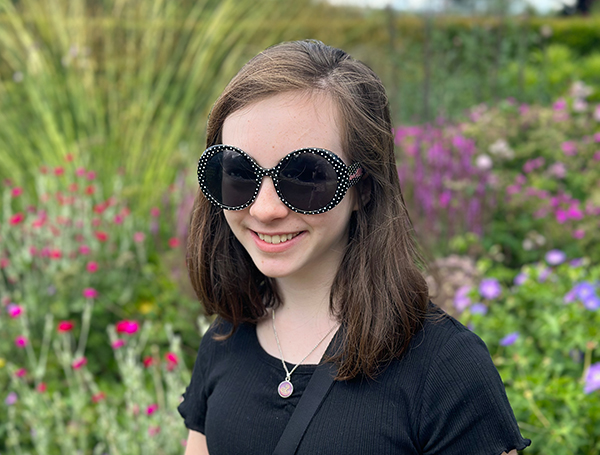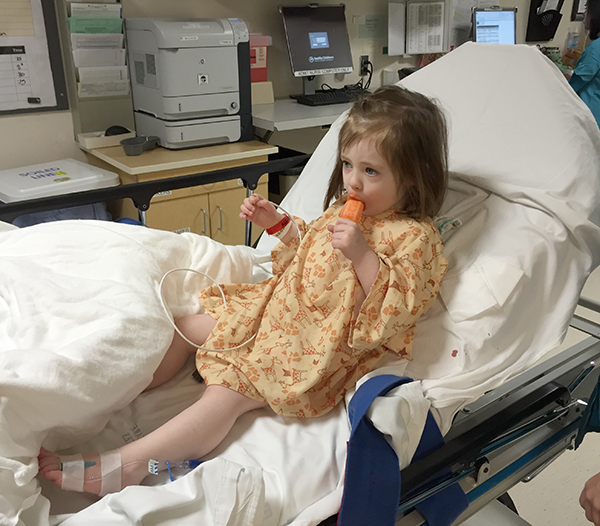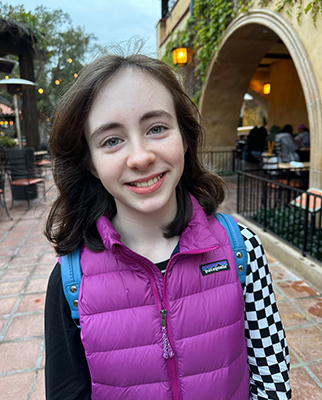‘I Have Celiac Disease, and My Life Is Delicious!’
5.15.2024 | Celia, Seattle Children's Patient
By Celia, a 12-year-old patient of Seattle Children’s Celiac Disease Program and member of Seattle Children’s Celiac Youth Leadership Council
Masking and Visitation Changes: Due to high rates of respiratory illnesses in our community, we’ve made changes to our masking and visitation guidelines. Learn more.
5.15.2024 | Celia, Seattle Children's Patient
By Celia, a 12-year-old patient of Seattle Children’s Celiac Disease Program and member of Seattle Children’s Celiac Youth Leadership Council
 My name is Celia, and I have celiac disease. It has always been a running joke with my family and classmates how my name is frighteningly like the spelling of the disease — my email handle for school even begins with “celiac” — though it was a complete coincidence.
My name is Celia, and I have celiac disease. It has always been a running joke with my family and classmates how my name is frighteningly like the spelling of the disease — my email handle for school even begins with “celiac” — though it was a complete coincidence.
I was diagnosed at age 3 at Seattle Children’s, such a long time ago that my memories are incredibly hazy. I remember only a photo — which my mother still has — of me sitting on a white hospital bed, looking unfazed and casually sucking on an orange-flavored popsicle. That photo is the only proof that I’ve been diagnosed, as I don’t remember the endoscopy.
Living with celiac disease is tricky, and it affects both me and my close family members. On a road trip, we can never stop at McDonald’s or a fast-food place because there aren’t any safe foods for me to eat. When traveling abroad, we can’t spontaneously stop at a cute London café and order scones and clotted cream without researching their kitchen and safety precautions.
Celiac disease limits what I can eat, but also what foods my mom and dad can keep in our house. I cannot remember a reality with gluten, but my parents do. I often wonder what is going on in their heads — if they’re secretly irritated or exasperated that they can’t bring home a packaged croissant from the grocery store because it will expose me to gluten.
 Another big way that gluten has affected me — and not positively — is at school. There are often class activities involving flour, sweet treats or Play-Doh. Whenever something with gluten is pulled out, my classmates speak up for me: “Oh, she’s allergic to gluten. She can’t have that!” After that outburst, I am left desperately wanting to raise my hand to contradict them: “I’m not allergic. Celiac disease is not an allergy. And what happened to speaking up for myself?”
Another big way that gluten has affected me — and not positively — is at school. There are often class activities involving flour, sweet treats or Play-Doh. Whenever something with gluten is pulled out, my classmates speak up for me: “Oh, she’s allergic to gluten. She can’t have that!” After that outburst, I am left desperately wanting to raise my hand to contradict them: “I’m not allergic. Celiac disease is not an allergy. And what happened to speaking up for myself?”
It occurs to me that they have my best interest at heart, but I am always rather irked that for some reason they think that they know my condition better than I do. These disappointing experiences prompt me to spread the word about celiac disease so people are properly informed and so all celiacs can feel supported and seen.
To that end, I joined Seattle Children’s Celiac Youth Leadership Council (CYLC) to help build our community and to help newly diagnosed patients and families. I wish it was possible to say to them, “I want all your problems to go away. I will help you live with celiac disease, but without any extra grocery shopping or planning.” Of course, such a thing is impossible; however, I hope to help families adjust to the strange, new world of celiac disease.
The Celiac Youth Leadership Council (CYLC) was founded by the Celiac Disease Program in 2018. The council comprises Washington youth (ages 10 to 19) diagnosed with celiac disease who provide a voice for all children and adolescents living with the disease.
“Providing a formal platform for kids to share ideas and support each other goes above and beyond the care physicians or dietitians provide,” says Dr. Dale Lee, medical director, Clinical Nutrition, and director of the Celiac Disease Program. “Council members are able to walk alongside other kids in their celiac journeys, giving them encouragement and guidance.”
Being newly diagnosed is like being a toddler just learning to walk. You’re stumbling around and crying, trying to get your balance. We can be the people that hold their hands, wipe their tears and help them find the confidence to walk — then to run. I love that CYLC provides opportunities to inform and explain. We are support people. We introduce them to their celiac community: the people who are experiencing the same problems and fears.
I am so grateful for the opportunities that come with being on the CYLC because every single event means being able to make the world more aware about celiac disease.
One of my favorite events of the year is the Celiac Guild’s Running From Gluten 5K in Seattle on May 18. CYLC members help plan this annual event — from brainstorming activities (like games and treasure hunts) to setting up booths and being available if participants have questions. At the event, there are various gluten-free food options from different companies in Seattle. The 5K is a bonding time and an “accepting-your-celiac” time for those affected by the disease; moreover, it’s a time for entertainment and joy. The event also raises funds for research and families in need.
 Although having celiac disease can be tricky, it has taught me so many life skills and shapes who I am today. I am not afraid to speak up for myself. I now have a confidence that I am sure I wouldn’t have today if not for celiac disease. On the CYLC, I have been a speaker on panels in rooms full of people, sharing my story with vulnerability. I work as a team with my CYLC peers, planning events and brainstorming ways to connect and educate people about the disease.
Although having celiac disease can be tricky, it has taught me so many life skills and shapes who I am today. I am not afraid to speak up for myself. I now have a confidence that I am sure I wouldn’t have today if not for celiac disease. On the CYLC, I have been a speaker on panels in rooms full of people, sharing my story with vulnerability. I work as a team with my CYLC peers, planning events and brainstorming ways to connect and educate people about the disease.
There are so many messages I wish I could share with you, but today I will give just one: I have celiac disease, and my life is delicious!
There is the stereotype that celiacs live off rice cakes and celery sticks — and even more than that, the belief that not being able to have gluten takes away value or fun from your life. I know firsthand what a false statement that is. On the contrary, having celiac disease has provided me with more power and experiences. It does not detract or lessen how well someone can live.
Celiac disease has been an active part of my existence for nine years. In my opinion, I have had such a full life already, bursting to the seams with food and happiness... and this is just the beginning.
Celiac disease is an autoimmune disorder that causes damage in the small intestine, affecting 1% of the world’s population. Currently, the only therapy for celiac disease is a gluten-free diet, which eliminates foods that contain gluten, such as wheat, rye or barley. Celiac disease is a lifelong condition that requires ongoing support and can create a financial burden for families to purchase more expensive, gluten-free foods.
Established in 2017, Seattle Children’s Celiac Disease Program is the first formal program in the Northwest dedicated to helping children with celiac disease thrive and enjoy healthy, symptom-free lives. The program also engages a volunteer Celiac Community Advisory Board comprised of parents, community members, food industry workers and medical professionals across Washington who provide guidance to the program and help raise awareness and provide education about celiac disease in their local communities.